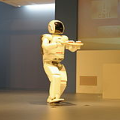Human and robot partners increasingly need to work together to perform tasks as a team. Robots designed for such collaboration must reason about how their task-completion strategies interplay with the behavior and skills of their human team members as they coordinate on achieving joint goals. Our goal in this work is to develop a computational framework for robot adaptation to human partners in human-robot team collaborations. We first present an algorithm for autonomously recognizing available task-completion strategies by observing human-human teams performing a collaborative task. By transforming team actions into low dimensional representations using hidden Markov models, we can identify strategies without prior knowledge. Robot policies are learned on each of the identified strategies to construct a Mixture-of-Experts model that adapts to the task strategies of unseen human partners. We evaluate our model on a collaborative cooking task using an Overcooked simulator. Results of an online user study with 125 participants demonstrate that our framework improves the task performance and collaborative fluency of human-agent teams, as compared to state of the art reinforcement learning methods.
翻译:人类和机器人伙伴日益需要共同工作,以便作为一个团队执行任务。为这种协作设计的机器人必须说明他们的任务完成战略如何与其人类团队成员在协调实现共同目标时的行为和技能相互作用。我们这项工作的目标是开发一个机器人适应人类伙伴在人类机器人团队协作方面的计算框架。我们首先通过观察执行协作任务的人类团队,为自主确认现有的任务完成战略提供算法。通过利用隐藏的马尔科夫模型将团队行动转化为低维表现,我们可以在不事先了解的情况下确定战略。机器人政策学习了建立混合探索者模型的每一项既定战略,以适应看不见的人类合作伙伴的任务战略。我们利用过度模拟器评估了我们的合作烹饪任务模型。与125名参与者进行的在线用户研究结果表明,与艺术强化学习方法相比,我们的框架提高了人类代理团队的任务表现和协作的流力。



